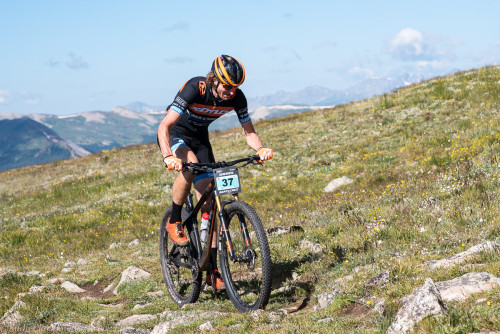The final topic in our series of ‘what ability to focus on for the various disciplines of racing’ will look at what ability is most needed for stage racing. Off road stage races come in many different varieties. From events just a few stages long to full week or longer. They also run over all kinds of terrain and at all possible elevations. Make sure you take the specific race demands into account while planning your training. To do well in stage racing you will need to have all the endurance and skills necessary for any single stage, but the one ability necessary that stands out is the need to compete day after day with very little recovery time between stages. Often the riders who excel in these events are not necessarily the fastest or strongest, but those who are able to recover best between stages.

Seen here at the Breck Epic stage race, Barry Wicks knows how to train for multi-day events as he wins stage 5 of the 2015 race. – Photo by Eddie Clark
The ability to perform consistently well stage after stage is quite trainable. The best way to do this is to mimic some of the demands of the event in training with back to back long difficult training sessions. Most riders have no trouble adding 2 long sessions into their schedule over a normal weekend, but in order to get your body used to racing day after day, including some extended blocks of training will help even more. Start by adding a hard session on a Friday before long back to back Saturday and Sunday rides. This will put you into the Saturday ride with “pre-fatigued” legs. Next, try to carve out a long weekend where you can get 3 or more long rides in. You could even extend this 3-day block with a hard ride on a Thursday (or Friday if you are doing the 3rd long day on a Monday). If you can work in a training camp where you have more back to back high volume days it would be optimal.
Here are a few guidelines for doing this kind of block training:
- If at all possible, riding on the type of terrain and at the elevation of your goal stage race is absolutely the best preparation.
- Don’t over do the intensity or duration on the first day of the block. If that first session is short, include some intensity, but if not, ease into the block with a comparatively moderate intensity and duration ride. You don’t want to have to cut rides short later in the block because of too much fatigue.
- Gradually increase the duration of the rides each day and have the last day of the block be the longest or nearly the longest day.
- Make sure you are well recovered going into the block of training, and add a significant amount of recovery time after you complete the block.
- Practice good nutrition while on the bike and immediately after each ride to optimize glycogen restoration. This means eating and drinking enough on the bike!
- Practice all of your recovery techniques post ride every day. This includes nutrition, trying to stay off your feet as much as possible, massage if available, and possibly most important, getting enough sleep!
- While doing 2 or 3 back to back days can be included in training often, doing a big block (more than 3 or 4 days) is best incorporated somewhere between 4 and 8 weeks prior to the goal race.
Also, be sure to read Sarah Kauffman’s great recent coach’s column article for other ideas about mountain bike stage race preparation.
Andy Applegate is a Pro level coach with Carmichael Training Systems. He has over 20 years of racing experience and has been coaching cyclists full time since 2001. His passion is endurance mountain bike racing. You can find out more about Andy and his training programs at www.trainright.com









